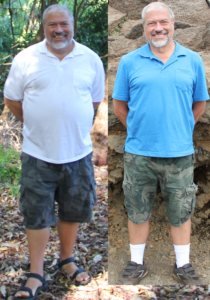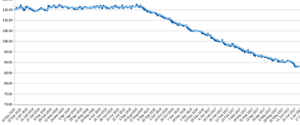
Some people have asked me how I am losing weight. After all, for many people, getting down to a healthy weight and staying there is HARD. With a sedentary job that involves mostly sitting at a desk in front of a computer, exercising little but my mind and my fingers, and being surrounded by sweet, sugar-enriched, processed foods and drinks, it takes some serious effort to not join the ranks of the seriously obese and suffer from the multitude of health problems that causes.
There is no magic pill that can make you lose weight with no effort and with no adverse side effects. There is, however, a simple formula that works if you can do it: consistently consume about 500 Calories (about 2092 kjoules) less than you burn each day. That will lead to a weigh loss of about a pound a week. Basically, all diets that lead you to do this work, if you can stick to them. My doctor advised that I avoid fad diets and to make healthy lifestyle changes.
Therefore, I chose not to do a “real” diet (i.e. temporary restrictions on specific foods just until a specific weight goal was realized), but instead to focus on permanent lifestyle changes that support reaching and maintaining a healthy weight. That difference may seem subtle, but to me, it is important. It seriously affects my ability to keep on track with my weight goals without feeling deprived or suffering. I can still eat almost anything I want, as long as I control the portions sensibly. About the only things I cut out are caffeinated drinks and drinks with refined sugar or high-fructose corn syrup added. My long days of addiction to Dr. Pepper, Cherry Coke, etc., are gone, along with the headaches and stomach discomfort they caused. Yes, they tasted good and made me feel good for a short time, but they weren’t actually good for me. Just cutting those out actually resulted in some weight loss without doing anything else, but that weight started creeping back. I had to do something much more drastic.
To get serious about losing the excess blubber, I first had to believe that it could be done. Sure, my wife would comment from time to time about how I was eating, but I was just following my appetite. If I felt hungry, I would eat until the hunger or craving subsided. Unfortunately, food cravings in my body are complex functions of not just the nutritional needs of my body, but my spiritual and emotional state, compounded by decades of bad habits. Still, whatever God commands can be done. Since He wants me to treat my body as a temple of the Holy Spirit, then it can be done. So, on the 23rd of August, 2016, I took the advice of my wife and my doctors and started logging my food and exercise and counting calories. In essence, I started “flying” by instruments instead of by the seat of my extra extra large pants. I remember when my mother would count calories with a huge notebook of the caloric content of thousands of foods and beverages. It was tedious. Fortunately, technology has advanced and I can take advantage of any of several good online and app services. The first one I tried was MyFitnessPal, available online and as an app for my phone and tablet. It worked well for me, and the price was right (free, or there is a cheap premium service that cuts out some of the ads and adds a few features), so I stuck with it.

Logging my food and exercise had an interesting effect. I could now see much more clearly how certain things affected my health, and seeing those things helped me to be motivated to do something about it. I started exercising regularly for real. I started limiting my calories consumed to fit my calorie budget. And I started losing excess fat. Being the übernerd that I am, I have been tracking my weight and various other measurements in a spreadsheet. Weighing myself regularly provides some feedback, so that I know if what I’m doing is working well or not. As you can see from the graph, my weight loss isn’t a perfectly smooth line. My weight fluctuates for a variety of reasons, but the constant downward pressure of new exercise and eating habits clearly has an effect. If you try to lose weight and weigh more one week than the last week, don’t give up. Just keep at it. So far, I have gone from a Body Mass Index (BMI) of 38.95 (seriously obese) to 29.37 (overweight, but not obese). Yes, I’m fully aware of the limitations of BMI as an indicator of excess fat and health, but seriously, in my case, it is pretty much on the mark. I plan to keep losing weight until I get to a BMI less than 25, then hold there in the “healthy” range of between 18.5 and 24.9. It will probably be some time towards the end of this year when I get under a BMI of 25 at my current rate of weight loss.
A rate of between one and two pounds per week is a good, healthy rate to lose weight and keep it off. Going faster is possible, of course, but studies have shown that faster weight loss is harder to keep off. It results in the body going into a lower base metabolism mode. It also doesn’t give the body much time to adjust to its new weight, and it tries very hard to get that weight back. I’m in this for the long haul, anyway. It took me over half a century to get so fat, so it is OK if it takes a year and a half to get down to a healthy weight.
Some things I have learned:
- Cutting back on sugar, and especially refined sugar, helps reduce hunger, even when the calorie count is the same.
- Our old elliptical trainer exaggerates the calories I burn by more than double. I multiply the number it claims by 0.45, and it comes out just about right.
- “Low fat” foods are not necessarily low calorie. Often, they have more sugar, and the first thing your body does with excess sugar is make fat. Read labels carefully.
- Vanity sizing is normal practice, even in men’s pants, in the USA and the UK.
- Exercise time is not lost time. Besides probably gaining it back in length of life, exercise time can be used to think, pray, be inspired, and when using an exercise machine, even to read the Bible, read email, etc.
So what are the major effects of my fit body overcoming my old fat body?
- Hypertension is gone. My blood pressure is better now without medication than it was with medication, before.
- Obstructive sleep apnea (OSA) is gone. Although obesity isn’t the only cause of OSA, and some people who are not obese have it, in my case, it was excess fat in my face and breathing passages that caused OSA. I used to need a CPAP machine to sleep soundly and breathe well at the same time. No more.
- I don’t have headaches much any more. I used to have them fairly frequently when I was obese and addicted to caffeine, probably due to a combination of caffeine withdrawal and OSA-induced sleep deprivation.
- Better mobility and less tired. Seriously, how could not carrying around 63 pounds of excess fat fail to have an effect? It is like the difference between walking up a mountain with a 50-pound bag of rice and 3 2-liter bottles of some soft drink and running up the same mountain without the excess baggage.
- No pain in my hip joints/lower back and in my feet. Good riddance to plantar fasciitis.
- My wife says my weight loss helps her to stay motivated in healthy habits, too.
- I get to clean out my closet and refresh my wardrobe. Fortunately, my clothing needs are very simple, or this could get expensive. Goodwill, the Salvation Army, etc., are my friends. Seriously, going from pants waist size 42 to 34 requires new pants to safely fly. When TSA demands you remove your belt then hold your hands above your head, it is important that the pants fit properly.